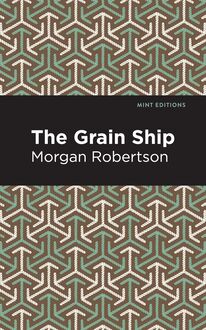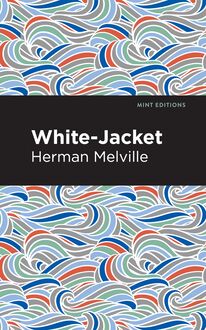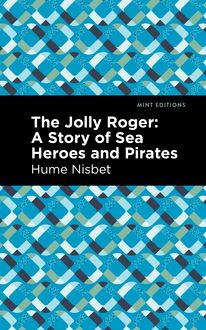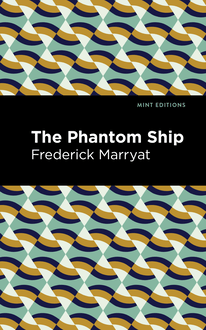-
 Univers
Univers
-
 Ebooks
Ebooks
-
 Livres audio
Livres audio
-
 Presse
Presse
-
 Podcasts
Podcasts
-
 BD
BD
-
 Documents
Documents
-
- Cours
- Révisions
- Ressources pédagogiques
- Sciences de l’éducation
- Manuels scolaires
- Langues
- Travaux de classe
- Annales de BEP
- Etudes supérieures
- Maternelle et primaire
- Fiches de lecture
- Orientation scolaire
- Méthodologie
- Corrigés de devoir
- Annales d’examens et concours
- Annales du bac
- Annales du brevet
- Rapports de stage
La lecture à portée de main
Vous pourrez modifier la taille du texte de cet ouvrage
Découvre YouScribe en t'inscrivant gratuitement
Je m'inscrisDécouvre YouScribe en t'inscrivant gratuitement
Je m'inscrisEn savoir plus
Vous pourrez modifier la taille du texte de cet ouvrage
En savoir plus

Description
The Jolly Roger: A Story of Sea Heroes and Pirates (1891) is a novel by Hume Nisbet. Published at the beginning of his career as a leading ghost story writer of the Victorian era, The Jolly Roger: A Story of Sea Heroes and Pirates is a tale of adventure inspired by the author’s travels in Papua New Guinea. Largely unknown by today’s audience, Hume Nisbet was a versatile writer whose experiences as an artist and traveler inform his wide-ranging body of work. From the mind of one of Victorian England’s finest popular fiction writers comes a tale of swashbuckling adventure set during the tumultuous reign of King James I. The story opens on the island of Laverne, a notorious pirate stronghold set in protective waters along the coast of South America. From there, a group of brave and impossibly bold pirates embarks on a journey in search of fortune across the Spanish Main. Along the way, they nearly succumb to the wiles of a thousand-year-old witch, perhaps the most memorable of Nisbet’s creations, but certainly not the most terrifying. With scant source material, the author summons an era of wonder and discovery for modern day readers, a feat which depends in no small part upon his own adventures on the islands of the South Sea. With a beautifully designed cover and professionally typeset manuscript, this edition of Hume Nisbet’s The Jolly Roger: A Story of Sea Heroes and Pirates is a classic of Victorian fiction reimagined for modern readers.
Sujets
Informations
| Publié par | Mint Editions |
| Date de parution | 16 novembre 2021 |
| Nombre de lectures | 0 |
| EAN13 | 9781513293080 |
| Langue | English |
| Poids de l'ouvrage | 1 Mo |
Informations légales : prix de location à la page 0,0500€. Cette information est donnée uniquement à titre indicatif conformément à la législation en vigueur.
Extrait
The Jolly Roger
A Story of Sea Heroes and Pirates
Hume Nisbet
The Jolly Roger: A Story of Sea Heroes and Pirates was first published in 1892.
This edition published by Mint Editions 2021.
ISBN 9781513290232 | E-ISBN 9781513293080
Published by Mint Editions®
minteditionbooks.com
Publishing Director: Jennifer Newens
Design & Production: Rachel Lopez Metzger
Project Manager: Micaela Clark
Typesetting: Westchester Publishing Services
D EDICATION
To My Friend,
W. H. K. Wright, F.R.Hist.Soc.,
of Plymouth,
I Dedicate This Story of
Sea Heroes and Pirates,
With Admiration for His Untiring Efforts
To Make Englishmen Remember
That Glorious Summer for
England and Liberty,
1588
C ONTENTS
B OOK F IRST —T HE W IZARD ’ S V ENTURE
I. H OW THE S HIP V IGO C AME TO W ITESTAPLE
II. N ECROMANCY
III. T HE M EN E NLIST FOR L ONG S ERVICE
IV. A N O LD E NGLISH S UPPER
V. H UMPHREY B OLIN T ELLS H IS S TORY
VI. A M AY D REAM
VII. “C OME B ACK , B ARD S HAKESPEARE ”
VIII. T HE P OWERS OF D ARKNESS AND THE P OWERS THAT BE
IX. T HE E SCAPE
B OOK S ECOND
I. T HE I SLAND
II. S HIPMATES
III. T HE E VIL E YE
IV. S HARK F ISHING
V. T HE R ESURRECTION OF A LSANDER
VI. R AISING THE W IND
VII. F ATHER N EPTUNE B OARDS THE V IGO
VIII. T HE H OME OF K ING D EATH
IX. A M ERRY N IGHT
X. T HE P ALACE OF THE K ING
XI. T HE K EEPER OF H IS J EALOUSY
XII. H OW THE P IRATES L IVED AT L AVERNA
XIII. T HE I NLAND R IDE
XIV. T HROUGH THE V ALLEY OF S ERPENTS
XV. Q UASSATTA IS B ORN
XVI. T HE E SCAPE F ROM THE V OLCANO
XVII. A D ANGEROUS D REAM
XVIII. T HE S PARTAN B OY AND H IS H IDDEN F OX
XIX. A T WILIGHT S AIL
XX. T HE W ATCHDOG B ETRAYS H IS T RUST
XXI. B RINGING H OME THE T REASURE G ALLIASES
XXII. A DMIRAL H UMPHREY B OLIN
XXIII. H UMPHREY A SSERTS H IS P OSITION
XXIV. T HE C APTURE OF THE G ALLIAS
XXV. A G AME OF B LUFF
XXVI. P IERRE D ENIS T AKES THE O NLY R OAD L EFT O PEN TO H IM
XXVII. T HAT V OICE A GAIN
XXVIII. T HE S AILING OF THE P IRATES ’ F LEET
XXIX. T OWARDS THE S PANISH M AIN
XXX. A S UCCESSFUL R AID
XXXI. T HE F EVER OF B ATTLE
XXXII. T HE T AKING OF P ORTO B ELLO
XXXIII. T HE B ATTLE OF THE P LAIN
XXXIV. D EATH OF A LSANDER
XXXV. T HE E SCAPE F ROM THE C HURCH
XXXVI. T HE R ETURN TO P ORTO B ELLO
XXXVII. H UMPHREY E NDS H IS J OURNAL
E PILOGUE
I. S IR H UMPHREY B OLIN ’ S A DVENTURES
II. T HE L AST
BOOK FIRST
THE WIZARD’S VENTURE
I
H OW THE S HIP V IGO C AME TO W ITESTAPLE
One morning in the spring of the year 1605 the honest dredgers of Witestaple were startled out of the calm and repose of their customary occupations by the somewhat unusual sight of a stately carrack, which swung round the Isle of Sheppey, and made directly towards their own town front, as if their little harbour was its destination.
It was a handsomely built ship, freshly painted and gilt, with new cordage and sails upon her, as if she had just come out of dock, as indeed she had. A gallant sight she presented to the staring eyes of these watchers on the shore, as she bore in before that easterly breeze—all sails set and bulging, with ensigns and pennons flying gaily, the morning sun gilding the sea under her, and herself like a purple haze against that golden glory.
The dredgers of Witestaple were an independent and a chartered body of men, who took life remarkably easy, and made the most of their royal privileges. They were rather conservative also in their ideas about strangers, and did not welcome them very graciously unless they considered something worth while could be made out of them. But a newly-bedecked carrack, fitted out for a sea-voyage as this one was, looked like something worth while, and therefore not to be regarded in the light of an ordinary stranger. She must have wanted something special from Witestaple, else she would never have turned out of her way down the Channel; and that something flavoured of profit to these hardy burghers of the waters; therefore with one accord they set down their morning mugs of beer, so that they might the better use their hands for the shading of their eyes; and rose from their seats, so that they might be ready to stroll down to the pier head, and lend a help with the ropes, by the time the carrack got there.
“Whoever is at the wheel o’ that ship knows his way in,” remarked one of the loungers as they stood waiting and watching.
“Ay, and they seem mighty short-handed by the way they handle her,” observed another.
“A fine, fast craft, but curiously emblazoned,” said a third.
“Lord a mussy! if she ain’t a flying the wizard’s ensign! Look, Aaron, the queer signs all over it done in silver, same as he shows up on the hill—stars and snakes, and sich-like devilish devices; and, by all the powers, yonder the old ’un comes with his witch sister to meet them. This is a curious sight, honest lads, and something that our good king might like to know about, if anyone could be found bold enough to tell it.”
“Perchance, William, only the less one meddles with sich-like cattle the better for himself. I, for one, feel like going back to my beer.”
“Right you are, uncle, so will we with you.” Thus, as with one accord the dredgers had left their work and come to the jetty to see the ship, they all went back again and left the harbour clear, for that was their habit and how they were wont to receive unwelcome strangers.
Ancient families have always peculiar habits of their own to distinguish them from the people of yesterday. The Honourable Company of Royal Dredgers had pedigrees reaching as far back as any noble in the land—from the time when William the Conqueror granted to them exclusive fishing and dredging rights to the present day. And they had taken means to retain these rights, and transmit them jealously from father to son. From generation to generation the eldest son inherited the rights and drew the dues, and so never lost his interest in his native land. The younger sons, as is the case with the aristocracy, could go off and better their conditions as they liked best; so they mostly became either servants to their eldest brother, or else went off as sailors, while the heirs remained ashore on duty, and looked after the family privileges as eldest sons and heirs generally do.
While the industrious dredgermen were regaling themselves in the sea-facing yard of The Neptune, and showing their independence by ostentatiously neglecting the strangers, the bulky carrack was slowly and majestically advancing towards the deserted pier, the tide being at the time high enough to carry it safely into the harbour.
It was a picturesque sight, with its lofty and richly decorated forecastles, towering stern, and bulging sides. The anchors hung at the bows ready for dropping, while the men were hard at work taking in sail. They worked leisurely in those days, and seemed to be rather short-handed from the way they laboured; but as the wind was light, and their progress easy, that did not seem to matter much in the present instance.
Onward she glided, slowing off as the sails were furled one by one, and throwing her shadow in front of her until it reached nearly to that all but deserted quay.
A carrack of about five hundred tons, very lofty in the bows and stern, with the main deck low and exposed, and with but little bulwark to protect it, at present; in time of war or during a storm, however, they used nettings to keep off boarders and guard the passengers.
She was coming on, and showing more of her bows, with the sides fore-shortened; curved, rounded upper bows plentifully ribbed and barred, with her four anchors hanging over, and the figure-head, a female half-length, protruding under the bowsprit, picturesque and clumsy-looking as a Thames barge of the present day, only more so, with her gun-holes and guns sticking out at every available space, from the top line right down to almost the water edge.
An old ship, and of Spanish build, which had been recently thoroughly overhauled, patched, and fresh painted, so that she glowed upon the waters in all the glory of her new coat. All the sails were at last reefed, so that she was crawling in with the tide, and the impetus of the wind which had lately bellied out her sails.
A four-master, with two yards on the fore and mainmasts, and lateen sails on the small stern poles. Heavy masts the two mainmasts were, with solid cages at the top of the shrouds, from where guns also stuck out, as indeed they did from every part, fore and aft. Whatever her present mission might be, she was plentifully equipped as far as firearms were concerned.
Along her exposed side could be counted eighteen large guns; three more lay flush with the maindeck; a double tier of twelves could be seen on the poop, facing the forecastle, to cover boarders; which, with the usual number on the stern, would make her a sixty-gun carrack, the description of vessel which explorers used for a long sea voyage in those days.
“Will she do, William?”
There were only three figures on the quay end, watching the approach of the ship.
An old gentleman, with thin, fragile figure, dressed plainly in black velvet, with rapier at his belt to denote his quality; a weak-looking, elderly gentleman he appeared to be, who trembled as he leaned heavily upon his ebony staff, with scanty white hair and beard, and watery, bleared eyes, which originally had been dark-brown.
His companions were a lady, who appeared to be as old as himself, and a man of about thirty-nine years of age, florid-faced and inclined to stoutness.
The lady was costumed plainly, and also in sable hue, and she too leaned heavily upon a staff of ebony. On her head she wore a black hood, which nearly concealed her face, allowing only the straight, thin nose and sharp chin to show, with the piercing dark eyes, which glowed in the shadow, and a single patch of white hair to show out amongst the black cloth—a sal
-
 Univers
Univers
-
 Ebooks
Ebooks
-
 Livres audio
Livres audio
-
 Presse
Presse
-
 Podcasts
Podcasts
-
 BD
BD
-
 Documents
Documents
-
Jeunesse
-
Littérature
-
Ressources professionnelles
-
Santé et bien-être
-
Savoirs
-
Education
-
Loisirs et hobbies
-
Art, musique et cinéma
-
Actualité et débat de société
-
Jeunesse
-
Littérature
-
Ressources professionnelles
-
Santé et bien-être
-
Savoirs
-
Education
-
Loisirs et hobbies
-
Art, musique et cinéma
-
Actualité et débat de société
-
Actualités
-
Lifestyle
-
Presse jeunesse
-
Presse professionnelle
-
Pratique
-
Presse sportive
-
Presse internationale
-
Culture & Médias
-
Action et Aventures
-
Science-fiction et Fantasy
-
Société
-
Jeunesse
-
Littérature
-
Ressources professionnelles
-
Santé et bien-être
-
Savoirs
-
Education
-
Loisirs et hobbies
-
Art, musique et cinéma
-
Actualité et débat de société
- Cours
- Révisions
- Ressources pédagogiques
- Sciences de l’éducation
- Manuels scolaires
- Langues
- Travaux de classe
- Annales de BEP
- Etudes supérieures
- Maternelle et primaire
- Fiches de lecture
- Orientation scolaire
- Méthodologie
- Corrigés de devoir
- Annales d’examens et concours
- Annales du bac
- Annales du brevet
- Rapports de stage




















